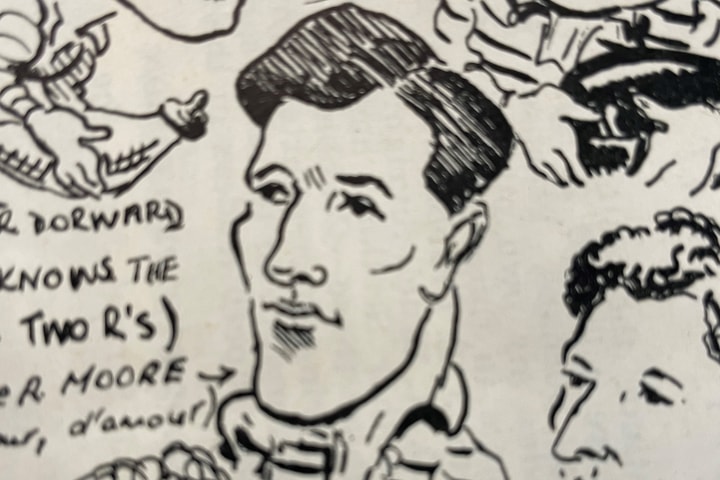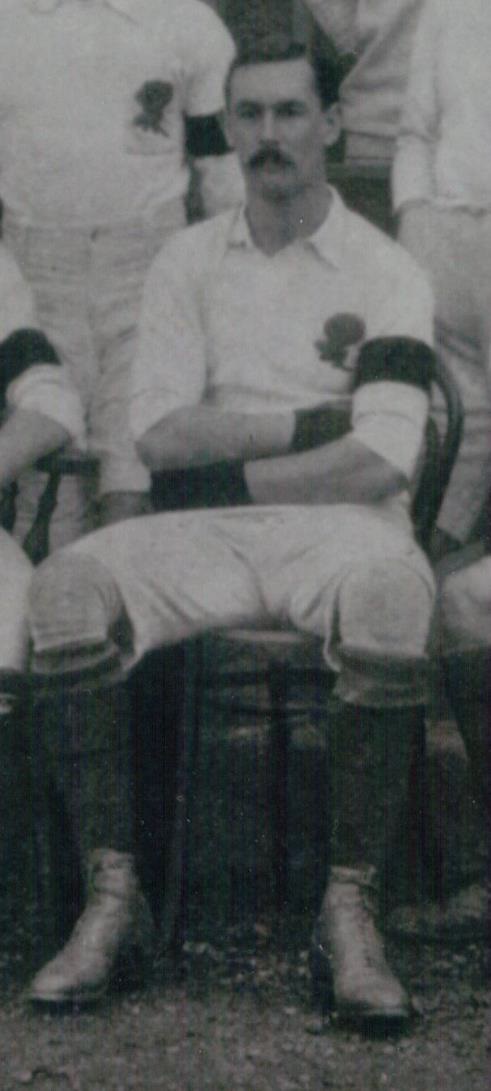
21 November 2025


Born on the 6th December 1878 at Deaf Hill, Trimdon, Durham, John Warburton Sagar was the eldest son of the Reverend Oates Sagar and Hannah Warburton. He was educated at Durham School and Jesus College, Cambridge. Whilst at Cambridge, he won rugby blues in 1899 and 1900. Cambridge won the 1899 encounter 22-0 with the Morning Post noting "…nothing could have [been] better than the play of Sagar…who gathered the ball unerringly and never once missed getting in his kick.." Cambridge lost the 1900 match 10-8, with Sagar being temporarily knocked out during an Oxford rush. However, he again received praise from the Morning Post, "and nothing could have [been] better than the defence of Sagar, the full back, whose long punts continually found touch." In 1900, Sagar also played for a London and Universities XV against the Rest of South in an International trial match which led to his selection for England, where he displaced incumbent 'Octopus' Gamlin as full back. The Pall Mall Gazette explained, "[Gamlin is] passed over in favour of Sagar, but little fault can be found with the selection committee in that respect. Gamlin is not quite the great man that he was last season and on Saturday he made several mistakes of a critical kind, whilst Sagar has improved with every appearance and is now playing a great game." However, he was to win only two England caps, both in 1901. Wales beat England 13-0 and Ireland won 10-6; both games were played away. The Devon and Exeter Gazette reported "Sagar…made such a fiasco...in the Wales match", whilst the Yorkshire Evening Post reported "Sagar was said to have been nervous in the Irish match." Sagar also played twice for the Barbarians. In February 1900, the Pall Mall Gazette reported, "A very one-sided game was played at Blackheath between the Barbarians and a team from Havre. The Frenchmen had crossed the Channel the previous night and had not made a good journey and so were not in the best form for the encounter. The Barbarians would have been wise had they tempered the wind to the shorn lamb instead of putting into the field a team consisting largely of Internationals and old Blues. The [side] could easily have beaten a representative team of the whole of France." A couple of months later he again represented the Barbarians, who beat Hartlepool Rovers 5-3. He won only the one Yorkshire cap - against Cumberland in 1900. He was selected for other games - for example against Cheshire in January 1901 - but as one paper noted "[he] had always to send back word." Sagar's club rugby career seems to have been severely hampered by his studies and employment as a private tutor. It appears that he played first with Mytholmroyd before joining Castleford in October 1900. The Leeds Mercury in October 1900 reported on a game between Castleford and Harrogate, noting that "Sagar's kicking was fine throughout, but his efforts were frequently neutralised by the cross wind." In April 1901, a reader of the Yorkshire Evening Post selected "a side from the present members of the Castleford Rugby [Union] and Northern Union Clubs" including Sagar at full back. The YEP's Old Ebor noted it was "good at full back," whilst querying the strength of the selected forwards. In July 1901, at a meeting to "consider the advisability of forming a Rugby Football club on purely amateur principles" in Wakefield, Sagar said "I have been asked to take the Chair in the unavoidable absence of Mr Rhodes and several other gentlemen who were kept away by business engagements." He noted "We have a grammar school from which time to time old boys come out who wish to continue the game and have nowhere to go and have to seek other clubs around such as Castleford." William Ticken Smith "had great pleasure in proposing that Mr Sagar be appointed captain, observing that they all knew his capacities as an International, Varsity and Yorkshire County player".

On his return from a round the world voyage in 1902, Sagar joined Loretto School in Scotland as an assistant master. He resigned in May 1903 when he was appointed as a Government Inspector in the Sudan. The Yorkshire Evening Post noting "[he] will leave England in the early summer." Conservative MP Kwasi Kwarteng, in his book 'Ghosts of Empire: Britain's Legacies in the Modern World', noted Sudan was a notably snobbish spot. One-third of all colonial political officers were the sons of clergymen and half of those recruited between 1902 and 1914 had a "Blue" (a sporting distinction) from Oxford or Cambridge, leading to the quip that Sudan was a land of "Blacks ruled by Blues". Sagar indeed fitted into this characteristic on both counts. He joined the Sudan Political Service, remaining there until 1924. He gained several promotions during his time in Sudan, becoming the Governor of Kordofan from 1917 to 1922, and the Governor of Wadi Halfa from 1922 until his retirement in 1924. He also received Egypt's highest state honour, the 'Order of the Nile' (third class). Upon retirement, he settled in Dulwich with his wife Margaret Grace. They married in 1913 when Sagar was 34 and his bride 43. However, the age gap between husband and wife was to narrow. On their return to the country in 1924, the shipping records list them both as 45! It would appear that after his wife's death in 1933, Sagar settled in West Southbourne, Bournemouth, where he died of myocardial degeneration aged 62 on 10th January 1941. In his will, he left his effects, valued at £1081, 14s 2d to his brother, having no offspring from his marriage.
About the Author - Richard Lowther is an amateur rugby historian and collector. He writes a monthly newsletter 'Burglar Bill' about the defunct Wakefield RFC of which he was a member. Copies can be obtained free by emailing [email protected]. He is a member of the Rugby Memorabilia Society and webmaster of Rolling-Maul.com and two Facebook groups, Rugby Memorabilia pre-1950 and Baines Rugby Card Collectors.
Follow the World Rugby Museum on Facebook, Twitter and Instagram.